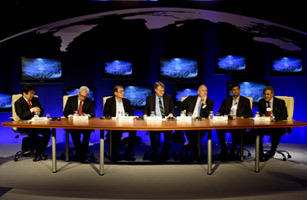
Big questions Michael Elliott, center, editor of TIME International, chairs our panel of economists
Could it be time to exhale? Cautious optimism about the state of the global economy pervaded conversation at the annual meeting of the World Economic Forum, the gathering of financial and political élite in snowy Davos, Switzerland. On the eve of the conference, Britain announced that it had officially (and finally) followed France, Germany, Japan and the U.S. out of recession with positive growth in the last three months of 2009. The same day, the International Monetary Fund raised its forecast for global expansion in 2010 to 3.9%. There was, it seemed, plenty of reason to dare to breathe easier.
But at the opening morning Davos session of TIME's Board of Economists, it was plain that nobody was ready to say the global economy was out of the woods. Participants looked to the future with hope and enthusiasm very much kept in check. The worst of the financial crisis and the global recession may be over; but they have left a painful and troubling legacy, and there are still large uncertainties about how the global economy will develop. Among them: whether emerging economies can truly shoulder the burden of recovery; how reform of financial-sector and banking regulation will take shape; and the ramifications (both economic and political) of continued high unemployment, especially in the U.S.
The discussion kicked off with a sober view of top-line GDP figures. New York University economist Nouriel Roubini — the Cassandra of Washington Square, the man who had warned long before September 2008 that there was a fundamental instability in the U.S. and global economy — cautioned that the U.S., Europe and Japan could see a fresh decline in growth in the second half of the year as the effect of government stimulus funds tapers off. Since many countries have pursued increased spending, worries about inflation could impact recovery; financial markets are already beginning to wonder how long nations such as the U.S. can sustain huge fiscal deficits. "There is debate about the shape of this recovery," said Roubini. Those who are optimistic think the recovery will be swift and substantial, in a classic V shape. Roubini said he was in the camp of those who think it will be U shaped.
Few in Davos would dissent from that view. The prevailing mood on the first day of the conference was somber. But David Rubenstein, co-founder and managing director of the Carlyle Group, a leading private-equity shop, pointed out that there had been something of a return of confidence. "I'd say it's a pretty attractive time to invest," Rubenstein said, "because prices are relatively low. I think the risk of systemic failure in the United States, financial system or the global financial system is gone. And as a result I think investors are now willing to put capital to work again and to get reasonably attractive rates of return."
Many of those investors will be looking to opportunities in what used to be called the developing world. As Raghuram Rajan of the University of Chicago pointed out, in the U.S., the figure 10% is shorthand for referring to the unemployment rate, but in China it more closely resembles the sizzling pace of annual economic growth. While few countries can match China, there are plenty of other buoyant spots around the globe, from India to Brazil.
Yet the panel struck a note of caution there, too. Consumer demand in the developing world is not yet ready to carry the load the American consumer did during other periods of global economic turmoil, such as after the Asian financial crisis of 1997. "My sense is that what we've had is a situation of excess demand being created by the industrial countries, and now the hot potato is being shifted to the emerging markets," said Rajan. "Historically, they've never managed it well." If a country such as India, where domestic demand is strong, is to continue to grow, it needs to manage huge challenges posed by inadequate infrastructure and a massive shift of population from rural to urban areas.
For the time being, though, the question of whether domestic demand in emerging markets can be sustained is something of a theoretical one. The sickly pace of job creation, especially in the U.S., is very real — and shapes the political debate, which in turn impacts proposals for reform of the financial sector. Dennis Nally, chairman of PricewaterhouseCoopers, reported the results of a recent survey of nearly 1,200 business leaders worldwide. Some 39% of companies planned to hire within the next year; yet 25% still planned to cut jobs. Cost management remained a global corporate imperative. "I think that tells you something about how the business community is looking at the next 12 months," said Nally. Without hiring and the money it puts into consumers' pockets, the recovery in consumption-driven countries like the U.S. is only going to get so far.